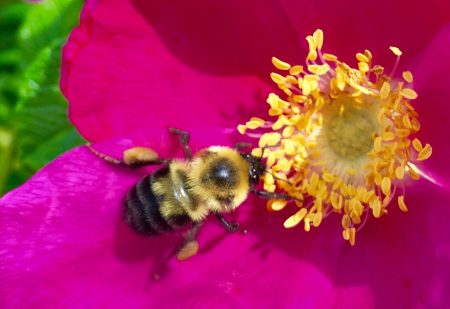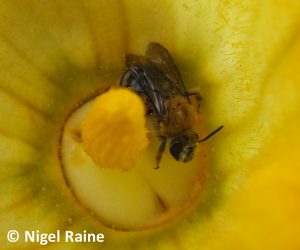
While the plight of the honeybee has grabbed public attention, the health of other pollinators vital to our food system remains largely unknown, according to a new University of Guelph report.
“There has been lots of work examining honeybee health, but it’s important that we understand more about the 421 other wild bee species in Ontario and other significant pollinators,” said environmental sciences professor Nigel Raine, co-author of the report and holder of the Rebanks Family Chair in Pollinator Conservation.
Besides wild bees, important pollinators include hoverflies, butterflies, moths, wasps, beetles and hummingbirds.
“Wild pollinators are really important to us and provide their pollination services to crops and wild plants effectively free of charge,” said Raine. “Roughly one in three mouthfuls of the food we eat depends on the services of pollinators, with 80 per cent of the most important staple crops being pollinated by wild insects.”
 The report, Status and Trends of Pollinator Health in Ontario, was commissioned and funded by the Ontario Ministry of Agriculture, Food and Rural Affairs. The report continues to inform the development of policy and conservation strategies for the province’s pollinators, such as the provincial Pollinator Health Action Plan announced in December 2016.
The report, Status and Trends of Pollinator Health in Ontario, was commissioned and funded by the Ontario Ministry of Agriculture, Food and Rural Affairs. The report continues to inform the development of policy and conservation strategies for the province’s pollinators, such as the provincial Pollinator Health Action Plan announced in December 2016.
The comprehensive U of G report highlights major environmental stresses likely affecting pollinators, and includes recommendations for land use and pollinator management practices, invasive species, pathogens, climate change, habitat loss and agrichemical use.
Alana Pindar, post-doctoral researcher and lead author of the report, said the next step is to gather information on wild pollinators in Ontario.

“Right now we don’t have a good handle on the status of wild pollinators in Ontario, which species are where and how populations are being affected by interacting environmental stressors such as habitat loss, climate change and agricultural intensification,” said Pindar, who wrote the report with Raine, environmental sciences professor Ernesto Guzman and research associates Emma Mullen and Melissa Tonge. “Understanding how to manage and conserve wild pollinators is more important now than ever with climate change and the unpredictability that comes with it.”
Through its partnership with the government, the U of G team is now monitoring more than 50 sites across Ontario. By collecting and identifying wild pollinators throughout spring and summer, the researchers can track populations and learn about species’ health and behaviour.
“Ultimately this information will be used to help manage and conserve these essential wild pollinators and the invaluable services they provide to crop production and wild plants,” said Raine.
Contact:
Prof. Nigel Raine
nraine@uoguelph.ca